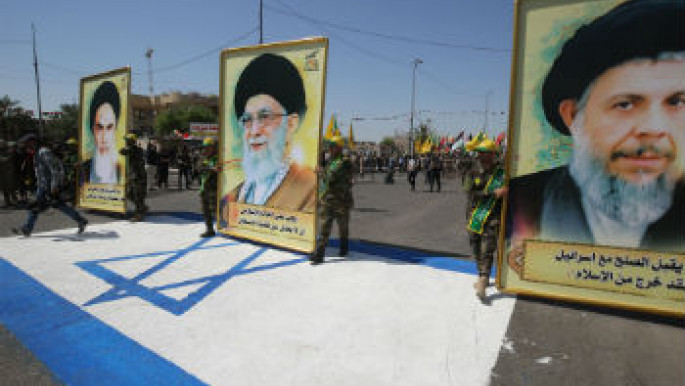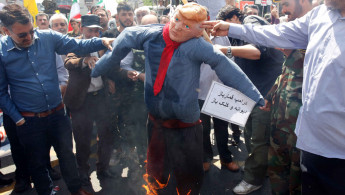Quds Day protesters rally against 'Deal of the Century' in Palestine, Middle East
Quds Day, first initiated by Iran's Ayatollah Khomeini in 1979, come this year just weeks before the release of the long-awaited and widely panned US peace plan for the Middle East, focusing on the Israel-Palestine conflict.
Rallies organised by militant group Hamas took place in Gaza, with the group's leaders calling it an "opportunity to reunite the nation", and called on all Arabs and Muslims to unite against the US peace plan.
Iranians in the capital Tehran set fire to effigies of US President Donald Trump, while in the Iraqi capital, Iran-backed militiamen marched over a large Israeli flag as part of the annual rallies.
Read more: The road to Palestinian prosperity does not lead through Bahrain
Held each year on the last Friday of the Muslim holy month of Ramadan, Iran has marked Quds Day since the start of its 1979 Revolution by the late Ayatollah Ruhollah Khomeini, as a way to position itself as the leader of the Islamic world. Al-Quds is the Arabic name for Jerusalem.
Iran claims the day is an occasion to express support for the Palestinians, but is often used an opportunity to inflame other regional rivalries.
Israel views Iran as its archenemy in the Middle East. Iran does not recognise Israel and supports the militant groups Hamas and Hizballah.
This year’s protests took place as the White House is promoting a summit in Bahrain to present the first phase of the plan, scheduled to take place on June 25-26. The plan, whose specifics have yet to be released, supposedly includes large-scale investment and infrastructure work in the Palestinian territories, much of it funded by wealthy Arab countries.
 |
|
| Protests in Iraq pay tribute to Ayatollah Khomeini, Ayatollah Khamenei, and Iraqi populist cleric Muqtada al-Sadr [Getty] |
The plan’s political vision has not been outlined, but glimpses of the plan that suggest it ignores the longstanding goal of Palestinian statehood has meant it has already been panned by Palestinian leaders and much of the Arab world.
Palestinian leaders say they won’t attend the summit in Bahrain. American officials say the Bahrain conference will not include the core political issues of the conflict: borders of a Palestinian state, the status of Jerusalem, the fate of Palestinian refugees or Israeli security demands.
As rallies began across the Iranian capital, demonstrators set fire to American and Israeli flags, as well as effigies of President Donald Trump and Israeli Prime Minister Benjamin Netanyahu. The rallies all headed to Tehran University, where the ceremony ended at Friday’s noon prayers. Similar rallies took place in 950 cities and towns across the country.
Many high-ranking Iranian officials attending the rally in Tehran, including President Hassan Rouhani and Foreign Minister Mohammad Javad Zarif. Both men derided the Trump administration’s so-called “Deal of the Century” peace plan, saying it would end in failure.
During the rally in Tehran, Zarif said: “It is unfortunate that some Arab leaders have this illusion that if they stand beside Netanyahu, they can reach their goals.” The remarks were reported on a Telegram channel affiliated with Iran’s state TV.
Iran’s semi-official Tasnim news agency said police in the western province of Kordestan had blocked a “terrorist operation” ahead of the Quds Day rally in Sanandaj city. Three alleged militants were arrested, though the report did not specify where they were captured or their affiliation.
Twitter Post
|
In Iraq, hundreds of Shia militia members staged a military parade on Palestine Street in central Baghdad, some of them setting fire to Israeli and US flags.
“The people in our region and the world are harassed by Trump’s and the United States’ policies, which are trying to dominate the will of the people. Today, there is a broad rejection of Trump’s decision to annex Jerusalem and consider it the capital of Israel,” said Moin al-Kazemi, leader of the Iranian-backed Badr movement.
The rally was organised by Iranian-backed militias collectively known as the Popular Mobilisation Forces. Militiamen in uniform marched with yellow flags, escorted by Iraqi federal police cars. “We will pray in Quds,” read some of the banners.
In the Syrian capital Damascus, a few hundred Syrians and Palestinians marked Quds Day by marching from the Hamidiyeh bazar in the old city to the landmark Umayyad Mosque, some of them shouting anti-Israel slogans and waving Syrian and Palestinian flags.
“No to the deal of the century,” a banner read. “Our Palestinian people and the free men of the Arab nation will thwart the deal of the century.”
Bahrainis also took to the streets in the capital Manama following noon prayers, raising Palestinian flags and shouting slogans denouncing Gulf and US disregard for the Palestinian cause.
However Bahraini security forces intervened to curb the demonstrations, which were encouraged on Thursday by Shia clerics in the country, some of whom have links with Iran.
A statement released by scholars called the occasion “a day for all oppressed people across the world”.
The remarks hint at the fact many Shia Bahrainis have been subject to a violent and repressive crackdown at the hands of the Saudi-backed government.
Follow us on Twitter: @The_NewArab





 Follow the Middle East's top stories in English at The New Arab on Google News
Follow the Middle East's top stories in English at The New Arab on Google News


